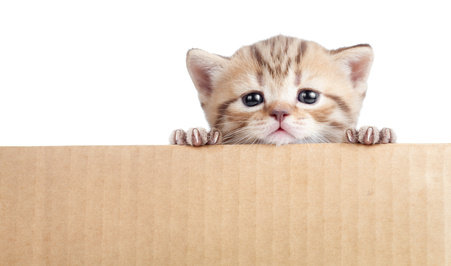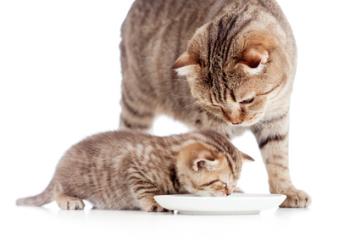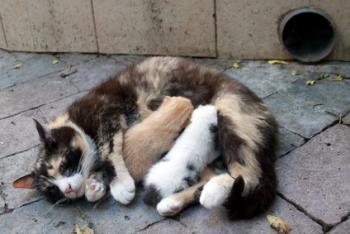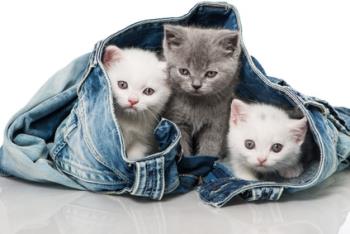Do you know when a kitten can leave its mother? We are often asked at our veterinary clinic if kittens can leave mom at 8 weeks or earlier. When a breeder shows you a five week old kitten and says you can take the little fur ball home right after you make the payment, would you believe them? The better question may be, should you trust them? Well, you are wise not to as this isn’t really a good breeder in our opinion. Second, is a 5 or even 8 week old kitten ready to leave its mother? The short answer is no. Why? Let’s find out.
In this article you’ll learn what socialization a kitten needs, what they learn from their mother and littermates, and the best time to leave their mom.

Table of Contents
When can a kitten leave its mom?
12 weeks. Ideally a kitten leaves its mom at 12 weeks. Why? Training and socialization. During this period, kittens imprint the information they receive. They learn about security, attitude toward humans, how to use the litter box, how to communicate with other cats, other pets, and humans. Kittens learn most of this by observing their mother and littermates.
Any stress that the kittens are exposed to during the socialization period, may leave its marks throughout the whole life of the adult cat. On that note, changing homes or “rehoming” is extremely stressful. As such, we recommended that kittens younger than 8 weeks should not be rehomed.
Can kittens leave their mom at 8 weeks old?

Yes, but it’s not recommended. Under normal conditions, a kitten can leave its mother at 12 weeks of age. One should never leave its mother before it is 8 weeks old. Seems like a really long time. Let’s apply some basic math to the overlapping ranges. As you’ll see, there are many reasons that 12 weeks is the ideal time to rehome a kitten. Let’s take a closer look at the growth stages that they go through.
There are three crucial growth stages that happen during the early life of kittens:
- The end of nursing must be gradual. Typically, nursing should end between 8 to 10 weeks of age. Sometimes, nursing takes longer and will not end until after 12 weeks. Nursing provides antibodies from their mother’s milk which helps build their immune system. A recent study found that kittens that nurse 7 weeks or longer are less likely to have weight issues as adult cats.
- The socialization period is between 2 to 8 weeks. This is the time when kittens learn the most from their mother and littermates. This is a critically important period for their social skill development. It’s been found that kittens that were separated early from their mother were more likely to develop health and behavioral issues later in life.
- Kittens play with their littermates actively until 12 to 14 weeks, when object play gradually replaces it. This is a critical time in a their social development. One thing they learn is how to play. If they bite or scratch too hard, they hurt their littermate. This teaches them to use lighter pressure when playing. This is very valuable when we humans play with our fur babies.
Weaning a kitten must happen gradually

Typically a litter of wild, feral kittens get mother’s milk exclusively for up to four or five weeks of age. At this time, the mother cat starts to bring her prey home. She lets her newborns play with the prey and get a taste for their future food sources.
This is an important part of what a mother cat gives to a weaning kitten. Not just the nutrition from her mothers milk, but the introduction to what they as an adult feral cat will need to hunt to survive. She will gradually wean the newborns from her. They will receive more solid food and less mothers milk simultaneously. In most cases, nursing ends when the feral kittens are 8 to 10 weeks old. On occasion, weaning may last for several months. One important fact to note is that at 12 weeks, the mothers milk contains no significant amount of nutrients. This is why the momma cat transitions them off of her milk.
The transition from mothers milk to solid food is a gradual process. Not all backyard breeders are aware of this and tend to either switch to solid kitten food too rapidly or allow the milk intake to last too long, often through bottle feeding.
From this point of view, 10 weeks of age is the earliest safe age for a litter of kittens to leave their mother. 10 weeks is the time when they have stopped nursing. If the they are still nursing at 12 weeks of life, something is flawed with the breeder’s weaning process strategy.
Playing is a social learning tool

Beyond learning from their mom what prey to hunt and eat, kittens learn a lot from being near their littermates. How? Play!
“So what?” you are probably thinking. “I can play with my kitty too.” Sound about right?
It’s not as easy as that. Play between kittens undergoes several complex stages and it’s tough to substitute something for this part of their development.
What do kittens learn from playing with their littermates? Play helps to develop hunting skills and coordination. It is a valuable tool that promotes environment exploration, maturation of the nervous system, helps them bond with other cats, and teaches them that biting causes pain. The last point is important for cat owners since it teaches a kitten not to bite. We encourage new pet parents to scream in pain when their kitten bites too hard or scratches too hard. This mimics what their littermates do and reinforces this feline behavior.
You’ve probably heard that it’s necessary to start a kitten’s training as early as possible because younger individuals learn quickly. But, did you know there’s also a period of extremely intensive learning? Kittens start what’s known as a sensitive socialization period when they are 2 to 3 weeks of age. This is a critical time for them to learn from normal behavior cues. Meeting new people is essential for their proper socialization so they don’t develop fearful behaviors when meeting strangers. They also experience new things such as toys, their environment, and their littermates. Consistent socialization should continue through 10 weeks of age. This natural development process helps them grow up to be well adjusted and live a healthy life.
We recommend littermates should not be separated until they are 12 weeks old. Of course, there is still a lot to learn after that age as well. This is why we say if you can, get two kittens from the same litter. There’s many advantages for them and you. We definitely recommend it. This is of course if it’s possible, and reasonable for you, your family, and your circumstances.
As you can see, this critical time period before 12 weeks is why it’s important to let your new kitten fully develop before removing them from their mother. We know, it’s tempting to bring your new four legged fur baby home at an early age. They are incredibly cute after all. However, if you do wait (and good reputable breeders will encourage you to wait) you will be pleased since your cat will grow up more confident and better behaved.
4 key things that a kitten learns from their mother
1. Hunting is, probably the best known skill that kittens must acquire from their mother. However, we need to clarify that this behavior is innate. Kittens are born with it they would try to hunt a mouse even if they never saw one before. However, the practice and skills necessary to make at least some catches successful are where their mother steps in.
2. Using the litter box is another task that they learn from their mother. While most sources cite that it’s not natural for cats to eliminate in the litter box, there is also a side of the story that it is natural for a cat to use the same elimination locations again and again.
3. Communication with other cats and humans is another crucial skill that kittens must learn from their mother. It’s learned in two ways. First is the communication that they have with their mother directly. It’s how they approach their mom and how she responds, how she allows or does not allow the nursing and how she stops them if their begs for attention are too intrusive. Second is how the queen herself communicates with other cats, dogs or humans.
4. Self grooming is among tasks that kittens learn from their mother altogether. They observe how momma cat grooms herself and try to copy her. Of course, the first tries are just licking their paws and maybe sliding them behind their ears. Most young kittens assume the task is done then. But as they learn, they become more skillful and are able to completely self groom themselves.
Summary
You now know that kittens should not leave their mom before the age of 12 weeks. You’ve learned the reason is because healthy kittens need their mothers milk for up to 12 weeks. Further, you understand that momma cat and a kitten’s littermates teach valuable social lessons like how to play, how to hunt, what wild prey to eat, and that biting hurts. The last behavior problem is tough to correct in an adult cat. We see a lot of unhappy pet parents with this problem. Using this knowledge when selecting your new four legged fur baby will go a long way towards a happy life for you and your pet cat. And keeping your Pet Happy is what we all want.
FAQ
Question: Can kittens leave their mother at 8 weeks old?
Answer: It’s not recommended. Kittens should not leave their mother before they are 8 weeks old. The ideal time for kittens to leave their mother is around 12 weeks of age.
Question: Why should we wait until 12 weeks to rehome a kitten?
Answer: Waiting until 12 weeks allows kittens to go through crucial growth stages, including the gradual end of nursing, the socialization period, and the development of important social skills through play with littermates.
Question: Why is play important for kittens?
Answer: Play with littermates helps kittens develop hunting skills, coordination, and social bonds. It also teaches them to use gentle pressure, preventing excessive biting or scratching.
Question: What happens during the nursing stage for kittens?
Answer: Nursing provides essential nutrition and antibodies from the mother’s milk, helping to build the kitten’s immune system. It also serves as a time for the mother cat to introduce the kittens to prey and teach them about future food sources.
Question: When should we start the weaning process for kittens?
Answer: Weaning typically begins between 8 to 10 weeks of age, although it may last longer in some cases. By 12 weeks, kittens should no longer be nursing, and their mother’s milk no longer provides significant nutrients.
Question: Why is it crucial for kittens to stay with their littermates until 12 weeks?
Answer: Staying with littermates allows kittens to continue learning and socializing, which contributes to their overall development and well-being. If possible, getting two kittens from the same litter is recommended for their mutual benefits and better adjustment to their new homes.
This article is a part of a series about cat care
Up next: Getting an adult cat instead of a kitten
Previous: How to identify a good cat breeder
